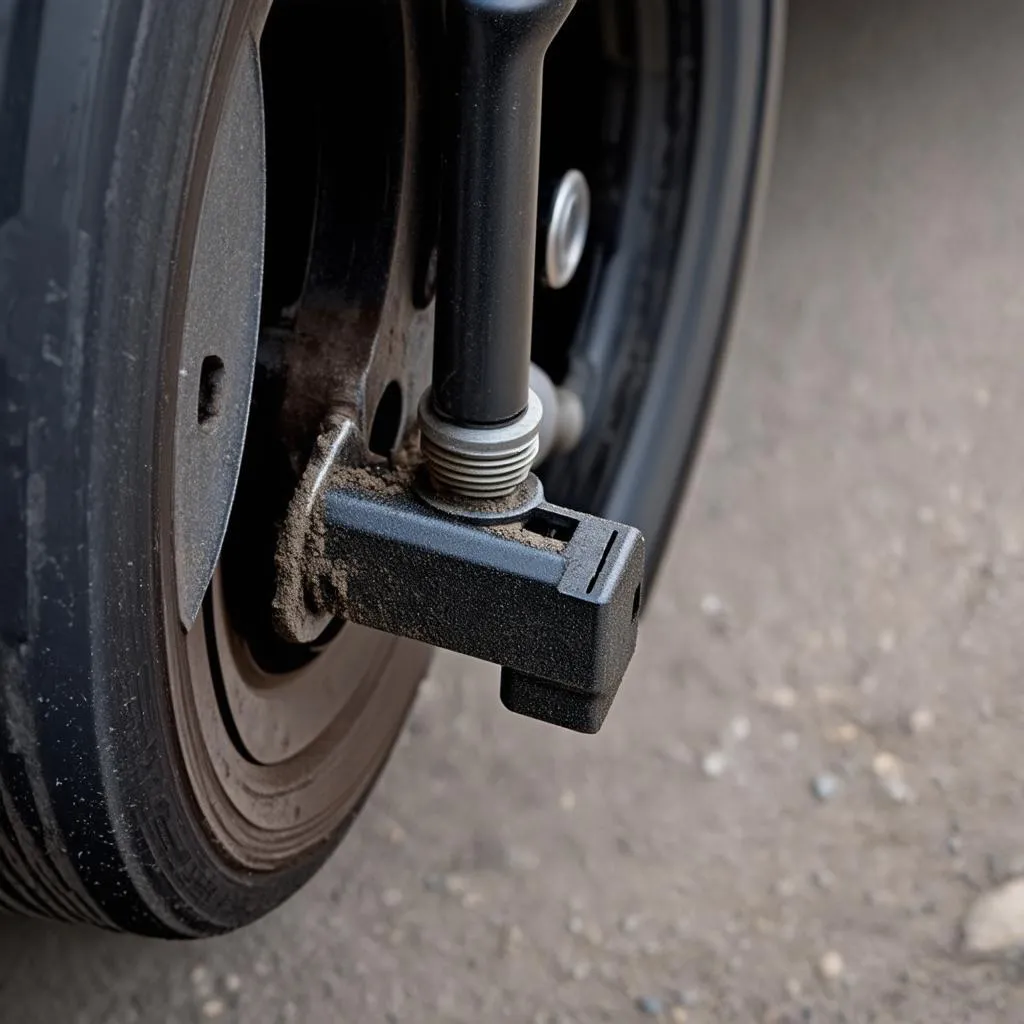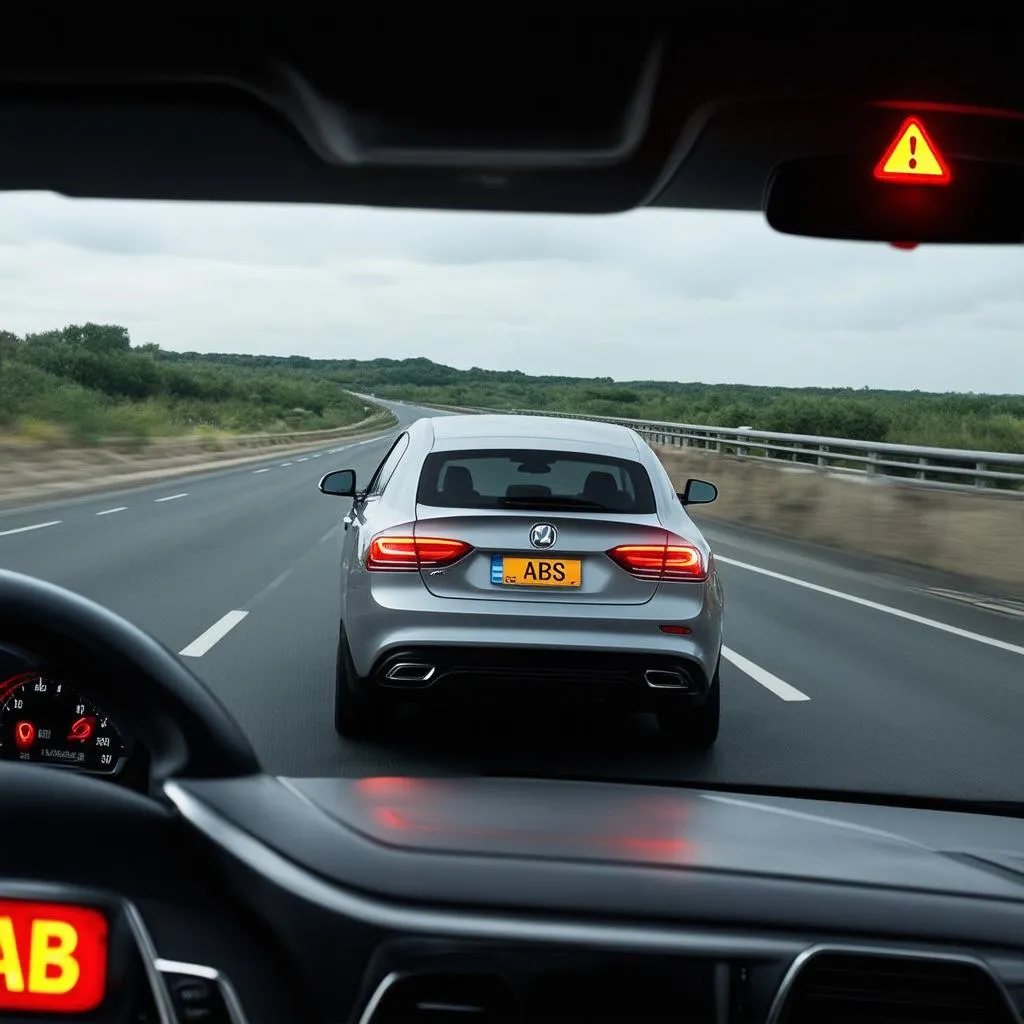Picture this: you’re cruising down Highway 1 in California, sun shining, music playing, when suddenly, a yellow light flickers on your dashboard – the ABS light. You think, “That’s odd,” but then it disappears as quickly as it came. A few miles later, it’s back. Now you’re left wondering, “Is this a minor glitch or a sign of something serious?”
Don’t worry, we’ve all been there. In this article, we’ll dive deep into the mysteries of the ABS light, exploring why it plays hide and seek and what you need to do to get back to worry-free driving.
Deciphering the ABS Light: A Mechanic’s Perspective
For a mechanic like me, the ABS light is like a car whispering its problems. ABS, which stands for Anti-lock Braking System, is a crucial safety feature that prevents your wheels from locking up during sudden braking.
“A flashing or intermittent ABS light always warrants attention,” says automotive expert, David Miller, author of “The Complete Guide to Automotive Electronics.” “While it might not be an immediate emergency, it suggests something within the system needs a check-up.”
Unraveling the On-Again, Off-Again ABS Light Mystery
So, why does the ABS light sometimes decide to play games? There are several possibilities:
1. A Temporary Glitch in the Matrix:
Sometimes, the culprit is a simple, temporary error within the ABS system. Think of it like a brain fart – your car’s electronics just need a quick reset. This could be due to a voltage fluctuation, a loose connection, or even extreme weather conditions.
2. A Faulty Wheel Speed Sensor:
One of the most common reasons for an intermittent ABS light is a problem with a wheel speed sensor. These sensors are responsible for telling the ABS system how fast each wheel is spinning. If a sensor gets dirty, damaged, or starts to fail, it can send incorrect signals, causing the ABS light to flicker.
3. Low Brake Fluid Level:
Your car’s brake system relies on hydraulic pressure to function correctly, and the ABS system is no exception. Low brake fluid can disrupt this pressure, triggering the ABS light.
4. Issues with the ABS Module:
In some cases, the problem might lie within the ABS module itself. This electronic control unit is the brain behind your ABS system. A malfunctioning module can lead to various issues, including an intermittent ABS light.
 Wheel Speed Sensor
Wheel Speed Sensor
What to Do When Your ABS Light Plays Peek-a-Boo
If you’re experiencing an on-and-off ABS light, the first step is to stay calm. It’s essential not to panic but to address the issue promptly. Here are a few things you can do:
-
Check your brake fluid: This is a simple DIY check you can do at home. If the fluid level is low, top it up and see if the light goes away. If it persists, it’s best to consult a mechanic.
-
Inspect the ABS fuse: Like any electrical system, your ABS system has a fuse that protects it from power surges. A blown fuse can disrupt the system’s operation. You can find the ABS fuse in your car’s fuse box, usually located under the dashboard or hood.
-
Use a Diagnostic Scanner: To pinpoint the exact cause of the problem, a diagnostic scanner is your best bet. This handy tool connects to your car’s computer system, reads error codes, and helps identify the root of the issue. You can find a variety of diagnostic scanners on the market, from basic models to professional-grade tools like the ones we use at Diag XCar.
-
Consult a qualified mechanic: If you’re unsure about diagnosing the issue yourself or if the problem persists, it’s always best to consult a qualified mechanic. They have the expertise, tools, and experience to diagnose and repair any issues with your ABS system.
Don’t Ignore the Warning Signs: Your Safety is Paramount
Remember, your car’s ABS system is a crucial safety feature designed to help you maintain control during emergency braking situations. Ignoring an intermittent ABS light is like ignoring a ticking time bomb – it’s better to be safe than sorry.
 Car with ABS Light On
Car with ABS Light On
Frequently Asked Questions About ABS Light Antics:
Here are some common questions car owners often have about a flickering ABS light:
Q: Is it safe to drive with the ABS light on?
A: While you might still be able to drive with the ABS light on, it’s not recommended. Your ABS system might not function correctly, increasing the risk of wheel lock-up during sudden braking.
Q: Can I reset the ABS light myself?
A: Sometimes, disconnecting the battery for a few minutes can reset the ABS system and clear temporary glitches. However, this is not a guaranteed fix and it’s crucial to address the underlying issue.
Q: How much does it cost to fix an ABS light issue?
A: The cost of repair varies depending on the root cause. A simple sensor replacement might be relatively inexpensive, while a faulty ABS module can be more costly.
Exploring Further: Related Car Care Insights
For more insights into car maintenance and troubleshooting, check out these informative articles:
- Car Starting Weak? Here’s What Could Be Wrong
- OBD2 Scanner for SRS: Your Guide to Airbag Systems
We hope this article has shed some light on the mystery of the “abs light going on and off.” Remember, keeping your car well-maintained is essential for your safety and the longevity of your vehicle.
Need Expert Help? We’re Just a Call Away!
Still feeling unsure about your car’s ABS system or need assistance with diagnostic tools? Don’t hesitate to reach out to our team of automotive experts at Diag XCar. Contact us via Whatsapp at +84767531508. We’re available 24/7 to provide you with expert guidance and support.
Drive safe and stay informed!